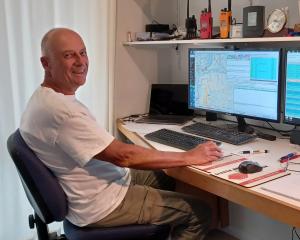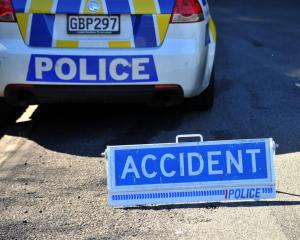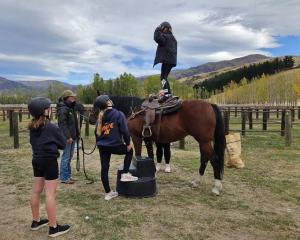
Before May 2022, Matt Pringle and Femke Hermans had never heard of the Teviot Valley Kids Count Fund.
Matt — musician, shearer and farmer — and Femke — a singer and actress from the Netherlands — were expecting their first child and opted for a home birth.
However, after a prolonged labour, attended by two midwives, things quickly escalated from a peaceful home birth to emergency services arriving and helicopters landing outside.
Mose sustained a brain injury during his birth and also suffered meconium aspiration syndrome, which caused other problems.
"We went from having a home birth with two midwives in the house to having two ambulances, the medical staff from the [Roxburgh] medical centre, fire brigade, a policeman and two helicopters at the house," Matt said.
"And there was like 12 or 15 people in the bedroom."
A lot of them arrived as an automatic response to the 111 call the midwives had made.
Femke said despite the sudden crowd arriving in their house they were "super calm" and were confident their son would be OK.
Mother and son were flown to Dunedin Hospital’s intensive care unit and Matt drove himself there.
During their stay in hospital a basket of food was delivered from the Teviot Valley community and in that was a form from the Teviot Valley Kids Count Fund.
With everything that was going on with Mose, the form was lost.
However, when they returned home Matt had a call from fund trustee Andy Reed asking for his bank account details. Without giving it too much thought, and knowing Andy well, Matt passed them on.
"We never really thought much about it because we were just really struggling to survive with what we were dealing with."
Housebound for several months after returning home with a sick baby, their first child, it was all hands to the pump.
"That’s where community came through."
The family had been involved with the Brain Injured Children’s Trust and Doman International, which had been dealing with brain injured children for 60 years, Matt said.
Femke said Mose, who turned 2 in May, was still immobile and totally dependent on his parents.
With Doman they had a treatment programme that worked on frequency, repetition and duration of activities to rewire their son’s brain.
They decided against sedating Mose, which was common in children with similar conditions.
"He screamed and fought against us because he has cerebral palsy as part of the symptom of the brain injury," Matt said.
Conditions including cerebral palsy, epilepsy and autism were symptoms of brain injury, according to the Doman philosophy.
"Doman treats the condition not the symptom."
There was no correlation between brain injury and intellect but the expression of that intellect was interfered with because of motor skills or speech impairment.
The treatment programme was tailored to Mose and every two weeks they had a Zoom call to check in. Aids such as picture and reading words cards were used.
There were also sleep, nutrition, mobility and breathing experts which added supplements and equipment on to the family budget.
The valley fund has helped with the cost of Mose’s treatment programme. While there was some funding available from the Brain Injury Trust it did not cover the cost and each six months the fund had helped with that too.
Many trips to Dunedin Hospital, including another Otago Rescue helicopter trip earlier this month, meant there was meals, petrol and parking to unexpectedly pay for, all of which the fund had helped with.
The Teviot community had been incredibly supportive.
Femke said living in Amsterdam had been so different from the Teviot Valley community, where Matt grew up.
Meals appeared at the door and working bees had taken care of their garden.
"It’s taught us to accept help and be humble," Femke said.













